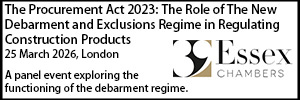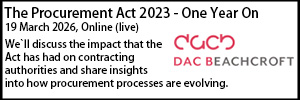High Court strikes out bid by councils to rescind loans from Barclays following 'LIBOR' rigging affair
- Details
A High Court judge has struck out claims brought by seven councils and the Greater Manchester Combined Authority for rescission of certain loans with Barclays which they said were affected by the LIBOR rigging affair of 2012.
The local authorities’ claims were on the grounds of fraudulent misrepresentation or (in one case) in the alternative for damages for misrepresentation.
The councils involved in bringing the claims over the ‘LOBO’ [lender-option, borrower-option] loans were Leeds City Council, Newcastle City Council, North East Lincolnshire Council, Nottingham City Council, Oldham Council, Sheffield City Council (together with the GMCA, the “Leeds Claimants”) and the London Borough of Newham.
In Leeds City Council & Ors v Barclays Bank Plc & Anor [2021] EWHC 363 (Comm) Barclays contended that the claims should be struck out for two reasons.
The first was that claimants could not show that they relied on the representations which they alleged were made (the "Reliance Issue").
Mrs Justice Cockerill noted: “At first sight, it might seem surprising that a strikeout application can be brought on such a basis. In truth however, the difference between the parties is on a point of law, namely the correct test for reliance. The application therefore proceeds on the basis that the facts pleaded by the Claimants are in fact true. The question is whether those facts are in law insufficient to prove reliance in a misrepresentation action. If the Bank is right, this disposes of both actions absolutely.” (judge's emphasis)
The second reason relied on by the bank was what had been called the "Affirmation Issue". It arose only if Barclays was wrong on the first issue, and if it succeeded it would dispose of most of the claim. The bank contended that if Mrs Justice Cockerill accepted as correct the legal principles that it said governed affirmation of contracts by a misrepresentee, then even if the claimants succeeded in proving misrepresentation, none of them had any real prospect of defeating the bank's contention that they affirmed the relevant contracts.
If the bank was right on this issue then that disposed of the claims for rescission, though not Newham's claims for damages.
In its skeleton argument, Barclays formulated the Reliance Issue as follows:
"Barclays contends that the Claimants cannot satisfy a central legal requirement concerning reliance – viz. that the claimant in a misrepresentation case must establish that it actively/consciously appreciated at the time that the alleged representation was being made to it."
Mrs Justice Cockerill said this was the crux of the Reliance Issue (judge’s emphasis): “The Bank says that (1) a necessary element of reliance is "awareness" of the representation being made; and that (2) none of the Claimants allege such "awareness" in the sense in which the law requires them to prove it.
“An important point here is that the Claimants do not say that they can satisfy that awareness requirement in the terms put forward by the Bank. Their position is that they do not need to do so, because the Bank misunderstands and misstates the correct legal test – or at the very least, that the Bank has not persuaded the Court to the requisite standard at the interlocutory stage that the test is what it says it is. This perhaps explains why, were the Bank's applications to succeed, the Claimants do not invite me to permit them to cure any defects in their cases by further amendments. The Claimants stand by their pleaded case.” (judge’s emphasis)
The ’Leeds Claimants’ had put the alleged representations as:
"17. In the course of proposing and/or transacting each of the LOBO Loans and, in particular, in putting forward transactions which were referenced to LIBOR, Barclays impliedly represented to each of the Claimants that:
(1) Barclays was not itself manipulating LIBOR (or GBP LIBOR) and that it did not intend to do so in the future ("LIBOR Representation 1"); and/or
(2) Barclays had no reason to believe that LIBOR (or GBP LIBOR) was being manipulated or that it would be manipulated in the future ("LIBOR Representation 2").
18. The LIBOR Representations were not corrected by Barclays and remained in effect at the time of and/or were repeated by Barclays upon entering into each subsequent LOBO Loan."
Newham had set out what it considered to be the alleged representations more extensively.
However, Barclays denied that the Leeds Claimants and Newham understood that the alleged representations were being made.
The reasoning behind the bank's strikeout applications on the Reliance Issue was that there needed not be a trial of the facts, because in their statements of case the claimants did not assert that they could satisfy the ‘Awareness Requirement’. Therefore, said the bank, they were unable to prove that they relied on the alleged representations.
Mrs Justice Cockerill she was persuaded that some requirement of awareness was established by the legal authorities. “Often that requirement will not be in issue; but that does not mean that it is not a requirement; just that in some cases that it is so obvious that the parties do not bother to argue about it. And when that requirement is in issue, in some cases the question will be what the claimant consciously thought, but in other cases it may be better expressed by a focus on active presence.”
She said there were two cases where the representations found or assumed to be found were essentially the same as the representations to be assumed in this case; and where the judges involved had said in one form or another that awareness was required.
These were:
i) In Property Alliance Group Ltd v The Royal Bank of Scotland Plc [2016] EWHC 3342 (Ch) “the context was LIBOR representations said to derive from the making of swaps transactions, the representations were very close to identical to those asserted by Newham and wider than those asserted by Leeds; no representations were found to have been made at first instance, but on the assumption that they were all made, it was held that the absence of any thought being given to the representations (the high point of the evidence being assumption of honesty/straightforward rate setting) was fatal.”
ii) In Marme Inversiones 2007 v Natwest Markets plc [2019] EWHC 366 (Comm), which concerned EURIBOR representations, “the Court rejected the complex set of representations alleged by the claimant, holding that the only representation that could have been possibly implied was one analogous to the one found in PAG (ie that the defendants were not manipulating and did not intend to manipulate EURIBOR), because no such specific basis from which to sensibly imply such complex representations could be found. Nevertheless, if there had been such representations, reliance would have required some contemporaneous conscious thought being given to them and the evidence that at best the relevant person had assumed that the rate was honest, and did not understand the representations to have been made was not enough.”
Mrs Justice Cockerill therefore concluded that Barclays was “broadly speaking” correct in the test which she needed to apply in the present case and further that proceeding on the basis of assumption in the present case would be wrong in law.
The judge continued:
153. However, as noted above, I do see the precise "contemporaneous conscious thought" expression of the test as one which was reactive to the particular facts of the case, and the course of evidence. I will therefore consider what the position is if one applies the understanding/"actively present" test, rather than the exact "contemporaneous conscious thought" test to the facts of this case.
154. In the case of the Leeds Claimants, there is an acceptance that the contemporaneous conscious thought test cannot be met. Their pleaded case is that "inducement is made out" where the decision-maker "would not have taken this course of action if they had known the true position". That of course posits the counterfactual of truth test which I have rejected.
155. That approach is reinforced in their response to the RFI on this point which is structured thus:
i) Inducement is established by proving that the representee was influenced/affected;
ii) Presumption of inducement;
iii) Individuals named would not have authorised the LOBO loans if they had known of the true position.
156. So far as understanding is concerned the Leeds Claimants have then pleaded that the matters listed above "show that the representations were actively present to the mind" of the relevant individuals. It is then added "for the avoidance of doubt" that "where an implied representation by a dishonest party has the effect of reinforcing an assumption by the (honest) counterparty that the contractual benchmark is honest and is not being manipulated, inducement is made out". This adds in the assumption approach, which I have also rejected. It begs the question however of how it is to be said that any such assumption was reinforced; or in other words that any representation was operative. This is where awareness becomes key. There is no pleading of fact which addresses this.
157. The Leeds Claimants have also pleaded that it would be sufficient to establish reliance if a representee was "influenced or affected" by the pleaded LIBOR Representations, "in the sense that the LIBOR Representations operated on their minds, whether consciously or subconsciously. It is alleged that this was the case. To hold otherwise would be to licence a rogue's charter". However the Leeds Claimants do not go on to plead any conscious operation on anyone's mind; and indeed it would seem that to do so would be inconsistent with the repudiation of the "conscious thought" test. That leaves the question of subconscious operation. Again that is a bare assertion. It is not pleaded by reference to any person or with any particulars, which itself would probably make it insufficient to carry the weight of the case. It would therefore seem to be effectively a reiteration of the assumption analysis.
158. Further I am persuaded that PAG and Marme indicate clearly that in a case of this sort more is needed than an assertion of subconscious operation. It follows that the Leeds Claimants' pleaded case, even if proved, has no real prospect of success, and that it falls to be struck out.
The judge found that Newham also did not assert that anyone understood a representation to be made at all. “That being the case, Newham's case has, on the law as it stands, no real prospect of success.”
Mrs Justice Cockerill decided that accordingly, the affirmation issue did not arise. However she went on to deal with it relatively briefly, concluding that if it did arise, it would not be suitable for summary determination.
Lucy Pert, partner at Hausfeld, which acted for the Leeds claimants, said: “We, along with our clients are currently considering the judgment and our options going forward, including any appeal.”
Sponsored articles
Walker Morris supports Tower Hamlets Council in first known Remediation Contribution Order application issued by local authority
Unlocking legal talent
15-07-2026 11:00 am















































